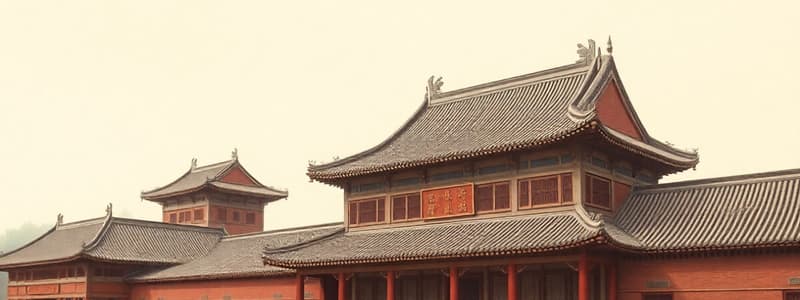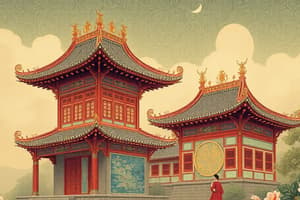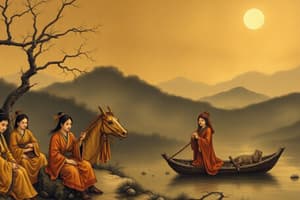Podcast
Questions and Answers
What was one significant economic change during the Song dynasty?
What was one significant economic change during the Song dynasty?
- Complete reliance on subsistence farming
- Introduction of barter systems in trade
- Increased agricultural production due to drought-resistant crops (correct)
- Reduction in urbanization due to rural population decline
What social advancement was facilitated by the civil service examination system in the Song dynasty?
What social advancement was facilitated by the civil service examination system in the Song dynasty?
- Social mobility for individuals from the upper class (correct)
- Increased educational opportunities for all social classes
- Reduction of bribery and corruption in government
- Empowerment of women in political positions
Which of the following technologies advanced during the Song dynasty?
Which of the following technologies advanced during the Song dynasty?
- Gunpowder for trade and warfare (correct)
- Nuclear energy solutions
- Mechanical calculators for taxation
- Telegraphic communication systems
How did Confucian beliefs impact women's roles in Song dynasty society?
How did Confucian beliefs impact women's roles in Song dynasty society?
What was a characteristic feature of the economy during the Song dynasty?
What was a characteristic feature of the economy during the Song dynasty?
Flashcards
Song Dynasty Economic Revolution
Song Dynasty Economic Revolution
The Song Dynasty experienced a significant economic and social transformation, marked by rapid population growth, urbanization, and technological advancements. This shift from a primarily agricultural economy to a more commercial one, characterized by specialized production and trade, led to increased social mobility and a stronger emphasis on cash transactions.
Song Dynasty Civil Service Exams
Song Dynasty Civil Service Exams
The Song Dynasty's civil service exam system, based on Confucian principles, provided a path for social mobility, particularly for men, through government positions. However, it was often plagued by bribery and cheating, highlighting societal inequalities.
Song Dynasty Women's Rights
Song Dynasty Women's Rights
During the Song Dynasty, women enjoyed some advancements in education and property ownership. This, however, was heavily influenced by Confucian values that emphasized the patriarchal structure of society.
Champa Rice
Champa Rice
Signup and view all the flashcards
Song Dynasty Urbanization
Song Dynasty Urbanization
Signup and view all the flashcards
Study Notes
Song Dynasty Overview
- The Song Dynasty's capital was Hangzhou.
- The dynasty's territory shrunk due to the Mongol conquest of the north.
- It was a Golden Age of art and literature.
- China maintained a monarchical system with a complex bureaucracy for governance.
Bureaucracy and Civil Service
- Bureaucrats were employed by the government (e.g., tax collection).
- A civil service examination system allowed capable individuals, mostly wealthy, to become bureaucrats.
- Bribery and cheating were prevalent in the examination system.
- Communities sometimes sponsored promising students to take the exam.
- Exams were based on Confucian principles.
Economic Revolution
- Population surged due to agricultural advancements (e.g., Champa rice).
- Urbanization and technological/industrial innovations flourished.
- Innovations included metallurgy, coal-powered industries, printing, shipbuilding/navigation, and gunpowder.
- A commercialized economy developed (internal waterways, cash taxes, paper money).
- People produced goods for sale (instead of subsistence farming/consumption).
Social Structure and Mobility
- Upper class social mobility existed due to the examination system.
- Confucian principles reinforced patriarchy, limiting women's opportunities (e.g., textile industry, foot binding, civil service exam).
- Women did have some rights (ownership of property, inheritance, dowry control), though education was frequently limited to preparing females to educate their sons.
- A tribute system existed with other nations, where the tribute payer would kowtow.
Studying That Suits You
Use AI to generate personalized quizzes and flashcards to suit your learning preferences.




